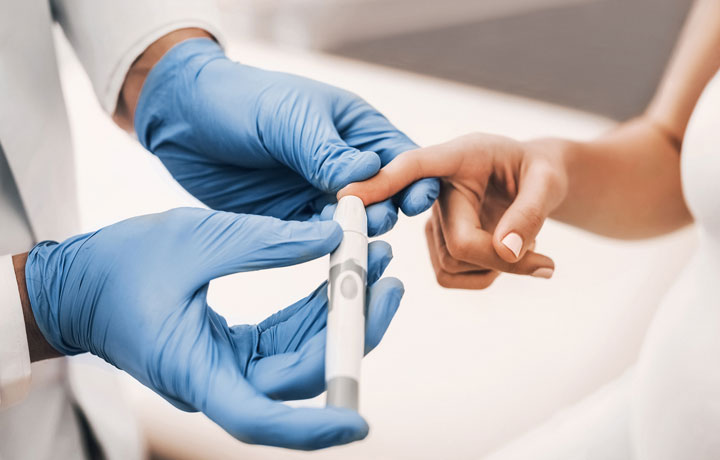Diabetes and endocrinology care
We can help you take care of and handle a wide range of endocrine problems, including diabetes.


Find diabetes and endocrinology care near you
Get high-quality endocrinology care
Our endocrinologists focus on your entire endocrine system and the hormones and chemicals that help the body work and make energy. These include:
- Adrenal, pituitary and thyroid glands
- Ovaries and testicles (reproductive organs)
- Pancreas (organ that helps digest food)
Care personalized for you
We’re here to keep you healthy and help you take care of your condition. Ask your doctor to connect you to endocrinologists in your area.*
Board-certified endocrinologists
Our endocrinologists are highly trained and specialize in the endocrine system to help care for your chronic (long-term) conditions.
Care for long-term health problems
We’ll create a personalized care plan for you that may involve medicine, lifestyle changes or other therapies.
Advice on creating a healthy eating plan
Eating healthy is important when you have an endocrine problem like diabetes because it helps you monitor your blood sugar levels.
Advanced care techniques improve outcomes
We offer the latest industry devices like glucose monitors and high tech insulin pumps. This technology helps keep you at your healthiest.
Video
You can live better with diabetes
If you’re pre-diabetic or dealing with diabetes, our endocrinologists are specially trained to help you. When you choose Optum, you get care that is:
- Focused on you – We take time to listen and understand
- Made easier – We help you get the care you need
- A better value – Our care helps you stay healthy and save on costs

opt ocaod prostate health transcript
[BACKGROUND MUSIC PLAYING THROUGHOUT THE VIDEO]
[Text On Screen – Optum]
[Text On Screen – Ask our doctors: How does the prostate change as men age? With Dr. Ken Cohen]
[DR. KEN COHEN SPEAKING ON SCREEN]
[Text On Screen – Dr. Ken Cohen, Physician, Greater Denver, Colorado]
DR. KEN COHEN: There's two ways. One, is it gradually enlarges in most men, and that can cause symptoms.
[Text On Screen – Enlarged prostate symptoms, Full bladder at night, Decrease in urinary stream]
And those symptoms are waking up at night to empty your bladder, a decrease in urinary stream, all the symptoms that men are familiar with regarding prostate enlargement.
[Text On Screen – Prostate cancer, No symptoms at early stages]
But the other thing that can happen is that you can develop prostate cancer, which typically, in its early stages, doesn't cause any symptoms at all.
[Text On Screen – Prostate cancer, Common to develop as men age]
Prostate cancer is so frequent that if you do autopsies in men that die for some other reason, at the age of 80 and beyond, about two-thirds of them or more have prostate cancer when you look at their glands, and those prostate cancers never would have progressed and never would have hurt men. So the goal is to find the aggressive ones, but not to find and treat the ones that aren't ever going to cause harm.
[Text On Screen – What makes the care at Optum different?]
One of the main assets of Optum is our ability to manage the health of populations.
[Text On Screen – The Optum difference, Advanced data systems]
What I mean by that is that we have very sophisticated data systems, where if I'm a primary care physician and I have my panel of patients, I don't necessarily understand what's happening to every one of them at every point in time.
[Text On Screen – The Optum difference, Data that guides patient care]
But if I have a data asset that can actually show me who's due for breast cancer screening, who hasn't had their cholesterol screening, who might be at risk for diabetes, who may have family risks for cancer that I may not have recognized.
[Text On Screen – The Optum difference, Provide actionable next steps for the patient]
The ability to detail the populations that I'm responsible for, and give me actionable information down to the level of the individual patient, is really a unique skill set of Optum.
[Text On Screen – Experience healthier care with Optum]
[Text On Screen – Become a patient or request your next appointment today]
[Text On Screen – Optum, Helping create a healthier world. *Optum is a registered trademark of Optum, Inc. in the U.S. and other jurisdictions. Because we are continuously improving products and services, Optum reserves the right to change specifications without prior notice. Optum is an equal opportunity employer. ©2024 Optum, Inc. All rights reserved.]
Common questions about diabetes and endocrinology
Your primary care doctor or family medicine doctor will let you know if you need to see an endocrinologist. Your doctor will help oversee all your care to make sure you’re getting what you need.
Make sure you see your doctor for routine yearly checkups and tests. If you have a family history of endocrine disease or diabetes, be sure to let your doctor know.
We can help you with:
- Adrenal gland problems
- Adrenal insufficiency
- Blood sugar levels
- Bone disease
- Cholesterol problems
- Diabetes, type 1 and type 2
- Hormonal imbalance and problems
- Kidney (organ that filters blood) disease
- Metabolic disorders
- Pituitary gland problems
- Pituitary tumors
- Thyroid cancer
- Thyroid gland problems
- Other endocrine problems
Your Optum endocrinologist will meet with you in person to learn your health history, do a physical exam and some tests. They may suggest medicine and diet (eating plan) changes. For some health problems, surgery may be needed.
We tailor your care plan to your unique needs.
Diabetes is a disease that involves blood glucose (blood sugar) levels that are too high. Having too much glucose in your blood can cause serious problems with your kidneys, nerves, feet and eyes. If you have diabetes, you're also more likely to have problems like heart disease or a stroke.
Your Optum endocrinology team will work to create a personalized care plan to help with problems involving the endocrine glands and thyroid.
A healthy eating plan is important when you have diabetes. We offer diabetes education to help you learn about healthier ways to eat. We can also help you create a weight loss plan.
You can help stay healthy and avoidgetting diabetes by making healthy lifestyle choices:
- Eat a balanced diet with many types of food, including fruit, vegetables, whole grains and lean proteins, such as egg whites, skinless chicken breasts and Greek yogurt
- Get regular exercise like walking, swimming or biking
- Keep to a healthy weight
- Don’t smoke
Yearly checkups with your doctor can help you track your health and catch early signs of diabetes.
The only way to know if you have diabetes is by testing how much sugar you have your blood, known as your blood glucose level. Your doctor can give you this test.
Common symptoms of diabetes include:
- Frequent urination (having to pee a lot)
- Being thirsty
- Extreme hunger
- Losing weight without trying
- Fatigue (feeling very tired)
- Blurred vision
- Slow-healing wounds
It’s important to see your doctor to get tested if you have any of these symptoms.
Helpful resources

Article
Diabetes distress: What it is and 8 ways to cope
The daily care for diabetes can take a toll on your mental health. Here are expert strategies for preventing diabetes burnout.

Article
What do I need to know about type 2 diabetes?
Diabetes requires a daily care plan. But with the right information and a supportive care team, you can live a long and healthy life.

Article
How to support a loved one with diabetes
A good caregiver offers support while respecting their loved one’s needs. These tips can help you strike that balance.
How do you take care of your health?
Answer these 10 questions to see if it’s time to switch to an Optum doctor and get the right care.
*Endocrinology services vary by location. Check with your doctor’s office or health plan for specific information.
Optum arranges for or provides medical and other clinical services in accordance with laws in each state it operates. Physicians or providers referenced on this website are to those who are either part of independent practices or to those medical practices managed by or owned, where permitted, by Optum. In all circumstances, physicians and other licensed professionals have complete authority for all medical decision-making and patient care. Optum does not determine or set the methods, standards, or conduct of the practice of medicine or health care provided by any of the practices or their physicians or other licensed professionals.

